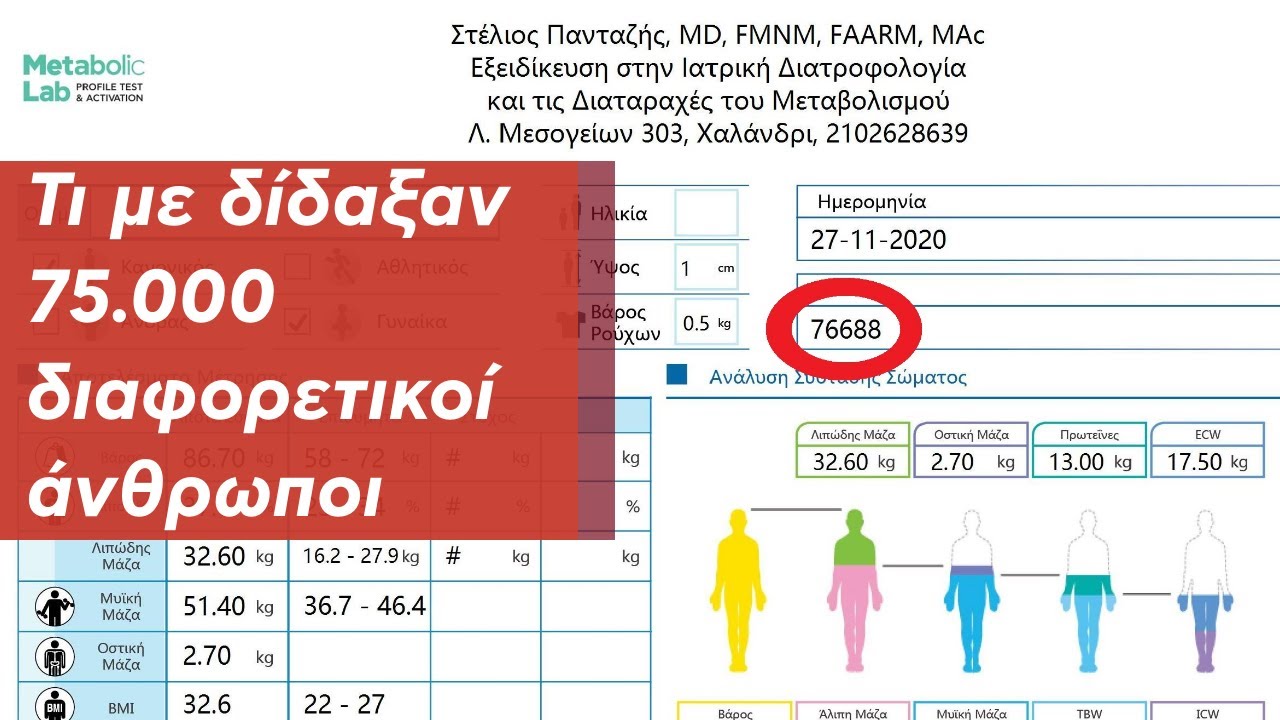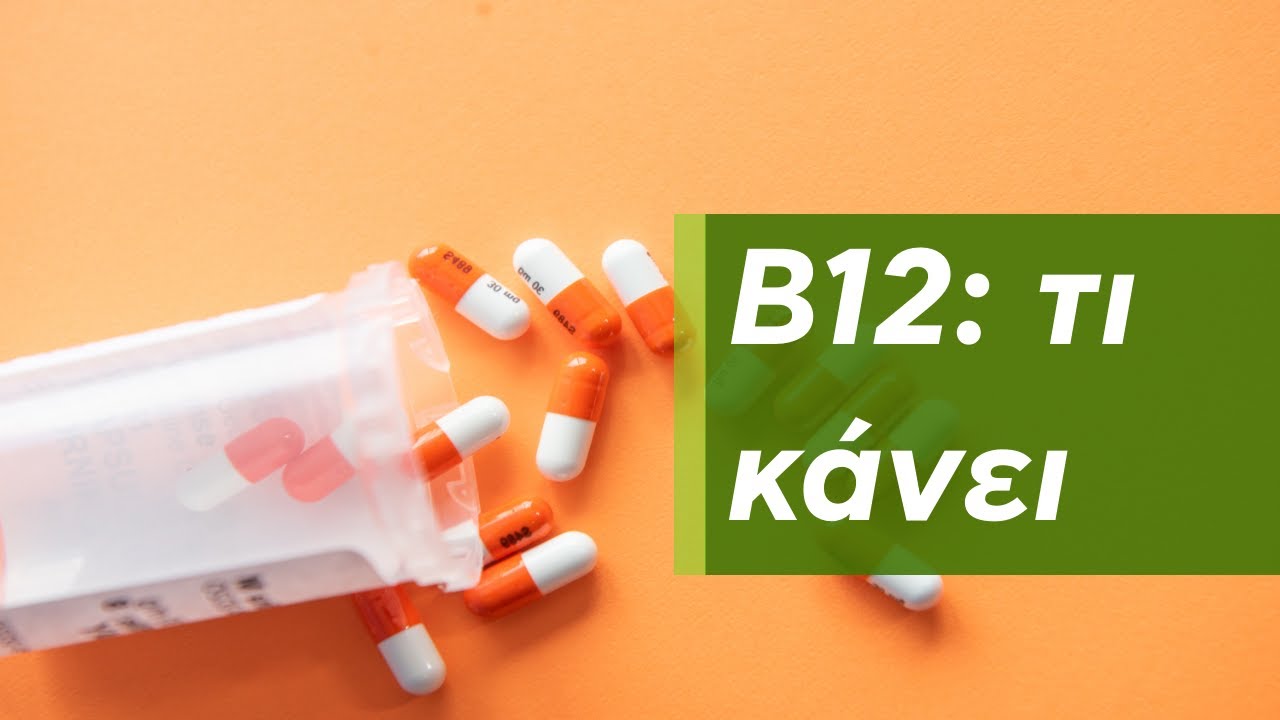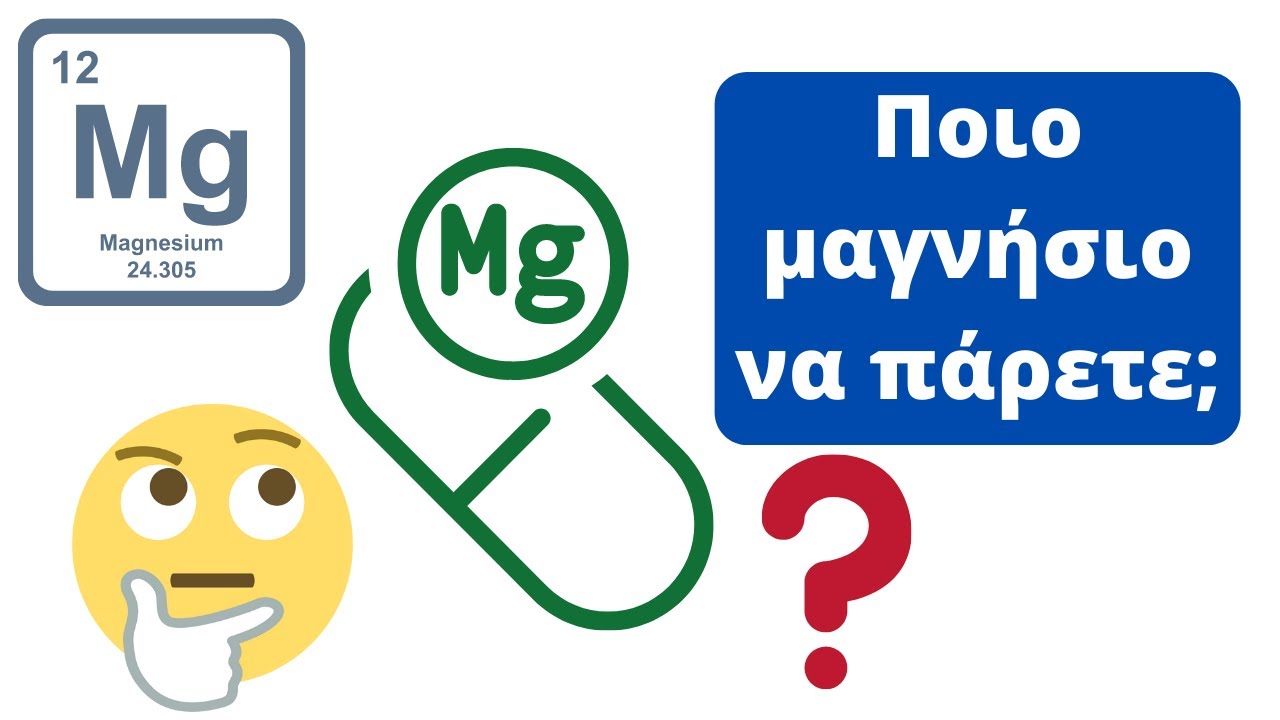Κείμενο
Χαίρετε, ονομάζομαι Στέλιος Πανταζής, είμαι ιατρός εξειδικευμένος στην Ιατρκή Διατροφολογία και στις διαταραχές του μεταβολισμού και σήμερα θα ήθελα να μιλήσω για την Β12. Και μάλιστα για τα επίπεδα της Β12 που είναι ιδανική για το αίμα και πως θα το διερευνούμε και αυτό μετά από πολλές ερωτήσεις που έχω δεχτεί σχετικά με το θέμα μέσα απ' το κανάλι, αλλά και από πελάτες που έρχονται στο ιατρείο. Πριν ξεκινήσω θα ήθελα να σας παρακαλέσω αν βρίσκετε το περιεχόμενο ενδιαφέρον να πατήσετε το κουμπί μου αρέσει, να το μοιραστείτε με άτομα που θα το βρουν ενδιαφέρον, και να χρησιμοποιήσετε τα σχόλια για να προτείνετε θέματα για τα επόμενα βίντεο. Ξεκινάμε λοιπόν στο θέμα μας σχετικά με την Β12. Κατ' αρχάς η Β12 είναι μία βιταμίνη που απορροφάται σχετικά δύσκολα. Και γιατί το λέω αυτό; Γιατί χρειάζερται έναν παράγοντα να παραχθεί σε σωστή ποσότητα στο στομάχι, και η απορρόφησή της γίνεται στο τέλος του λεπτού εντέρου μέρος που συχνά αναπτύσονται αρκετά μικρόβια τα οποία έρχοναι ενίοτε ή μπλέκονται με το παχύ έντερο που ξεκινάει μετά από λίγο και αυτό οδηγεί συχνά σε δυσκολίες στην απορρόφηση της Β12. Και γι' αυτό μπορούμε να πούμε ότι στα άτομα άνω των 40 ετών 1 στους 4 δεν έχει επαρκή επίπεδα Β12 στο αίμα του. Φυσικά, το θέμα είναι και πως ορίζονται τα επαρκή επίπεδα στο αίμα. Και αυτό είναι το θέμα που θα μιλήσουμε σήμερα. Αλλά πριν αρχίσω, και πάλι να πω ότι η εξέταση που χρησιμοποιούμε, επειδή μετράει Β12 στο αίμα και όχι στα κύτταρα, δεν μπορείς να ξέρεις εάν η Β12 στα κύτταρα είναι επαρκής μόνο και μόνο από το αίμα. Ουσιαστικά το αίμα είναι σας να βλέπεις τους δρόμους μιας πόλης και να προσπαθείς να καταλάβεις πόσα αμάξια υπάρχουν παίρνοντας μια φωτογραφία, μια στιγμή τους δρόμους μιας πόλης. Αυτή είναι η εξέταση αίματος. Δεν θα δεις πόσα αμάξια υπάρχουν παρκαρισμένα μέσα στα σπίτια κτλ. Οπότε, έχει κι αυτή ως εξέταση τα προβλήματά της γι' αυτό κιόλας είναι λίγο δύσκολο να τραβήξουμε απόλυτες γραμμές και να πούμε ότι αυτό είναι εντάξει, αυτό δεν

είναι εντάξει. Αυτό που είναι σίγουρο πάντως είναι ότι αν κάποιος έχει βιταμίνη Β12 στο αίμα του πάνω από 350 μπορεί να είναι αρκετά σίγουρος ότι είναι επαρκέστατα τα επίπεδα που θα έχει και στα κύτταρά του. Επίσης, αυτοί που έχουν κάτω από 200 πρέπει να είναι αρκετά σίγουροι ότι υπάρχει πρόβλημα. Ότι η Β12 που είναι στο αίμα τους είναι χαμηλή. Πρέπει να προχωρήσουν σε κάποιες αποφάσεις, κάποιες κινήσεις. Τώρα, υπάρχει ένα μεγάλο μέρος του πληθυσμού που υπάρχει στην γκρίζα ζώνη μεταξύ 200-350. Ας πούμε ότι έρχεται κάποιες που έχει μια απάντηση μεταξύ 200 και 350. Τι μπορεί να κάνει; Η πιο απλή λύση είναι να ξεκινήσει να παίρνει συμπληρω΄ματα διατροφή με Β12, αυτά που θα βρει στο φαρμακείο, τα πιο απλά, τα πιο οικονομικά και να παίρνει 3 φορές την εβδομάδα. Θα παρατηρήσει ούτως ή άλλως ότι οι δόσειςπου υπάρχουν στα φάρμακα σε σχέση με αυτές που συστήνονται είναι μέχρι και 1000 φορές παραπάνω, οπότε το πιο πιθανό είναι ότι παίρνοντας μια ταμπλέτα 3 φορές την εβδομάδα, Δευτέρα-Τετάρτη-Παρασκευή, μετά από μερικές εβδομάδες να να δει σημαντική αύξηση Αν δεν δει σημαντική αύξηση, θα πρέπει να ψάξει το λόγο. Και σ'αυτό θα περάσουμε σε λίγο. Μια άλλη προσέγγιση, πιο επιστημονική, αν θέλετε, είναι να ψάξει να βρει αν μια μέτρηση στην ζώνη 200-350 είναι όντως επαρκής για το σώμα του. Άρα μπορεί να κάνει το εξής: μπορεί να πάρει φυλλικό οξυ για μερικές εβδομάδες, 3-4 ή και 6, και μετά από αυτό το χρονικό διάστημα να μετρήσει την ομοκυστεΐνη. Η ομοκυστεΐνη είναι μια μέτρηση που μπορούμε να κάνουμε στο αίμα η οποία αυξάνεται όταν έχουμε έλλειψη φυλλικού ή Β12. Άρα, λοιπόν, παίρνοντας φυλλικό οξύ, φροντίζει να μην έχει έλλειψη σε φυλλικό οξύ και μετράει την ομοκυστεΐνη. Αν δούμε ότι η ομοκυστεΐνη είναι χαμηλά τότε σημαίνει ότι η Β12 δεν επαρκεί και πρέπει να πάρει συμπληρώματα Β12. Φυσικά, κάποιος μπορεί να με ρωτήσει γιατί να μπει σε αυτήν την διαδικασία; Αλλά εκει θα έχουμε και μία έξτρα πληροφορία, την ομοκυστεΐνη, που είναι σημαντική. Αν η εξέταση

της ομοκυστεΐνης είναι κάτω από 15, τα εργαστήρια την δίνουν φυσιολογική, αν και η αλήθεια είναι ότι ιδανικά πρέπει να είναι κάτω από 10. Δηλαδή, η περιοχή 10-15, ναι μεν είναι αποδεκτή, σίγουρα δεν είναι ιδανική. Τώρα, τι γίνεται αφού έγινε αυτό το πράγμα, πήρε συμπληρώματα διατροφής, εκεί πρέπει να δούμε ένα πράγμα: ανεβαίνει η Β12 με ταμπλέτες Β12; Αν ανεβαίνει σημαίνει ότι η απορρόφηση είναι εντάξει. Αν δεν ανεβαίνει, τότε σίγουρα θα πρέπει να μπει σε μια διαδικασία να αναζητήσει γιατί δεν ανεβαίνει η Β12 μετά από συμπληρώματα διατροφής. Όχι μετά από ενέσεις. Μετά από ενέσεις και να μην δουλεύει η απρρόφηση, θα ανεβεί. Αυτό είναι σίγουρο. Μιλάω συγκεκριμένα για ταμπλέτες. Άρα λοιπόν κάποιος παίρνει ταμπλέτες Β12, δεν ανεβαίνει η Β12 πρέπει να μπει σε διαδικασία διερεύνησης με την βοήθεια κάποιου ιατρού. Και ας ξεκινήσει με έναν γαστρεντερολόγο γιατί οι 2 πιο συχνές αιτίες που δεν απρροφάται καλά η βιταμίνη Β12 χρειάζονται γαστροσκόπηση. Είναι η ατροφική γαστρίτιδα και η κακοήθης αναιμία. Η πρώτη είναι σχετικά συχνή, η δεύτερη είναι λιγότερο συχνή. Και οι δύο μπορούν να διεγνωστούμε με μια γαστροσκόπηση, οπότε εκέι θα πρέπει να κατευθυνθούμε. Για την 3η συχνότερη αιτία, που είναι οι φλεγμονώδεις παθήσεις του εντέρου, δηλαδή η νόσος Κρον και η ελκώδης κολίτιδα και μια άλλη πάθηση του εντέρου που λέγεται κοιλιοκάκη, εκεί είναι λίγο πιο δύσκολα τα πράγματα, για τις φλεγμονώδεις παθήσεις του εντέρου δηλάδή νόσος Κρον και ελκώδη κολίτιδα αρκεί μια κολονοσκόπηση, συνήθως. Πρέπι όμως να είναι κάποιος σε έξαρση για να δούμε βλάβες συνήθως Αν δεν είναι σε έξαρση δεν θα δούμε πάντα την βλάβη. Η κοιλιοκάκη είναι μια άλλη διαδικασία, πάλι συνήθως με την βοήθεια ενός γαστρεντερολόγου μπορεί να γίνει η διάγνωση αν υπάρχει κάτι τέτοιο. Από εκεί και πέρα υπάρχουν κι άλλες αιτίες που συναντάμε σπανιότερα, όπως να υπάρχει διαταραχή στη χλωρίδα του εντέρου, διαταραχές του ανοσοποιητικού, όπως ο Λύκος ή η νόσος του Γκρέιβς, κάποια αυτοάνοσα νοσήματα που ευτυχώς

δεν είναι πολύ συχνά. Πάρα πολύ συχνό αίτιο είναι η μείωση του pH του στομάχου από φάρμακα. Άρα, λοιπόν μποροώ να πω ότι τουλάχιστον οι μισές περιπτώσεις που έχουν χαμηλή Β12 είναι άτομα που μακροχρόνια παίρνουν φάρμακα για το στομάχι που μειώνουν τα οξέα του στομάχου. Όπως το losec, το nexium, το controloc, το pariet, παλιότερα το zantac και τα λοιπά. Τέλος, κάποια φάρμακα για το ζαχαρο επίσης μειώνουν την απορρόφηση της Β12 όπως η μετφορμίνη που κυκλοφορεί με την εμπορική ονομασία glucophage, glucoplus κτλ. Φυσικά, όλα αυτά όταν κάποιος τρώει ζωικά προϊόντα γιατί τα άτομα που δεν τρώνε ζωικά προϊόντα αυτοί που είναι vegan, εκ των πραγμάτων πρέπει να παίρνουν Β12 αλλιώς είν αι αδύνατον να καλύψουν τις ανάγκες τους. Αυτά λοιπόν για τα επίπεδα της Β12 και ποια είναι τα φυσιολογικά επίπεδα στο αίμα και πως μπορούμε να τα διερευνήσουμε. Σας ευχαριστώ πολύ. Καλημέρα σας.
























































































































0 Σχόλια